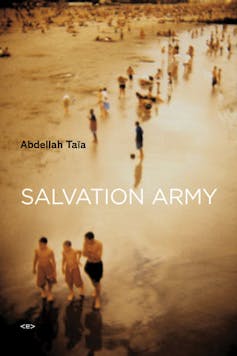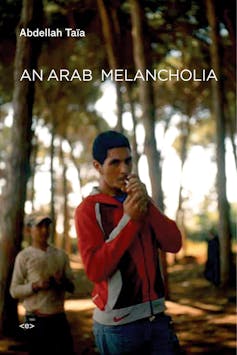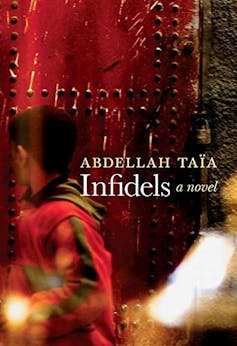Abdellah Taïa was born in 1973 in Rabat, Morocco. He at the moment lives in Paris. He’s the primary author from north Africa – and in reality the Arab world – to brazenly declare that he’s homosexual. In 2006, he got here out in a extremely publicised article within the Moroccan journal Tel Quel. This was thought-about scandalous by conservative Muslims.
Being queer is commonly seen as conflicting with being non secular. But, in African contexts – as in different components of the world – faith and queerness intersect in a number of and productive methods.
Learn extra:
Love, violence and every day survival: inside Morocco’s LGBTIQ neighborhood
A lot of the tutorial examine of faith and queerness in Africa has centered on Christianity. This runs the chance of reinforcing the concept of Islam as a extra homophobic “different”. Nevertheless, Islam generally is a useful resource of queer creativity and subjectivity in modern Africa.
A small however rising physique of literary works have represented what queerness means in African Muslim societies. Taia’s novels are a major instance of this.
We got here collectively as a scholar of French and queer literature, and a scholar of faith and African research to contemplate Taïa’s work alongside texts by queer Muslim writers from different components of the continent. In our analysis we argue that doing so recognises the continent’s political, cultural and mental range.
We additionally deal with the problematic historic distinctions between north and sub-Saharan Africa, which are sometimes imagined as totally different and diametrically opposed. In truth, they share many lived Muslim African experiences.
Abdellah Taïa’s work
Taïa has revealed quite a few novels, usually with a semi-autobiographical component. He additionally produced a movie, Salvation Military, that particulars the complexity of being homosexual in Muslim societies of Morocco.

MIT Press
Though his work has obtained essential acclaim and awards internationally, this has not been the case in his residence nation.
His most notable novels which were translated into English embody Salvation Military (2009), An Arab Melancholia (2012) and Infidels (2016).
These all problem the tradition of discretion and silence on queer-related points in north Africa and the broader Muslim world.
Taïa’s books have performed a key position in constructing an archive of African queerness and have foregrounded the place of Islam in such gender and sexual identities.
Islam just isn’t inherently homophobic
Taïa’s novels exhibit that Muslim cultures and Islamic traditions aren’t inherently homophobic. This counters the frequent notion by Muslim conservatives that homosexuality is a sin. Quite, Muslim social areas are portrayed as selling bodily closeness and call between our bodies – Muslim societies are linked to appreciable ranges of homosociality and tolerance for homoeroticism.

MIT Press
For Taïa, queer our bodies can discover intimacy, safety and acceptance within the ceremonial and mystical areas created by Islamic practices of communal and personal prayer.
In Infidels, he describes how the area of the hammam, or steam baths, is without delay homosocial, intimate and erotic. Throughout his first go to to a hammam, the narrator is stunned by how males confirmed off their virility. He sees males “in a brand new mild: fragile, delicate, good-looking, and open to all experiences”. He says:
An infinite tenderness handed between their our bodies, by their strongly scented, intoxicating pores and skin. They brushed towards one another, they touched. Pure sensuality.
Writers from sub-Saharan Africa have supported Taïa’s assertion of how Muslim cultures usually tolerate queerness. Novels like Fairytales for Misplaced Youngsters by the Somali author Diriye Osman, Confessions of a Gambler by Rayda Jacobs, in addition to Jamil F. Khan’s Khamr: The Makings of a Waterslams spotlight how queer sexuality is tolerated in Muslim communities in several African nations.
Reimagining Islam
Islam, like the opposite Abrahamic religions, may be illiberal of queerness. Completely different components of the Quran are cited in admonishing homosexuality.
Taïa’s novels, like these from sub-Saharan Africa, present that it’s attainable to rethink Islam to seek out inside it freedom of being and expression. This can be a restorative and liberatory course of.
Reimagining Islam is rooted in particular native contexts and histories. Nevertheless, when these disparate histories, texts and contexts are learn collectively, they offer a wealthy impression of how Islam tolerates queerness on the continent, each traditionally and so far.
The protagonist of Salvation Military explains:
Little by little, I re-examine my views about Arab tradition, Moroccan custom, and Islam. Lose myself fully, the higher to seek out myself.
The reimagining of Islam takes place not outdoors the faith, however reasonably inside it.
One other character in Infidels finds that:
God already accepts us as we’re. He made us this fashion. On this situation. On this state of affairs. We settle for his choices … However He, God, Allah, just isn’t like them, isn’t just like the picture they fabricated from Him. God is in me. He’s additionally in you.
Why this issues
Literary texts are essential in illuminating the varied methods queerness exists and is negotiated in Muslim contexts in Africa. What emerges from analyzing these novels is that practising Islamic ritual and religion doesn’t essentially must battle with queer African lived realities. Quite, Islam can affirm these marginalised methods of being.

Seven Tales Press
Admittedly, some queer African Muslims expertise appreciable ranges of religiously motivated queerphobia. This disparity, nonetheless, highlights the significance of inventive and literary writing as a device for representing, critiquing and reimagining non secular realities and their influence on on a regular basis lived experiences.
Literary texts don’t merely mirror, however mannequin the world. Due to this fact, they are often seen as types of African Muslim queer worldmaking.




